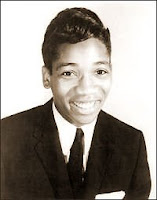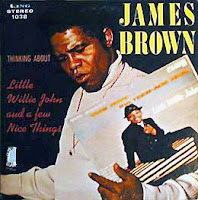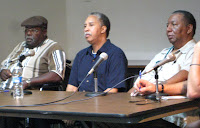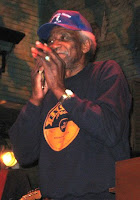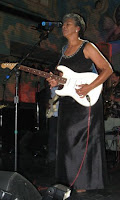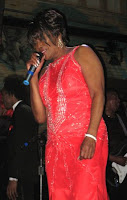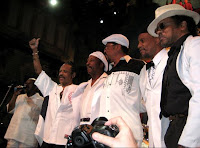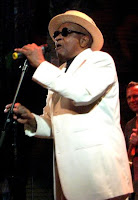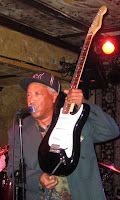Al Robinson - Wake Up (Imperial 5762)
 Wake Up
Wake UpI've been thinking a lot about Alvin Robinson lately. Yeah, I know I've written about him before, as have Dan Phillips and Larry Grogan, but I still don't think he's appreciated enough.
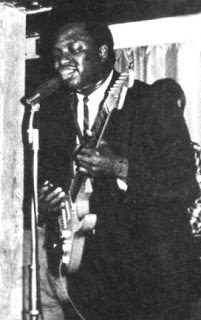 He never made an album, and only managed to dent the charts once, but I still consider him to be one of the great voices of R&B. I was introduced to his music by the infamous 'tape', and have been hunting for it ever since. When I found this amazing B side you're listening to now on eBay recently (after about twenty years of digging), I knew I had to share it with you. Just an awesome song, it was released in 1961 and written by George Davis, the fabled New Orleans session guitarist who would go on to play that smokin' guitar on Robert Parker's Barefootin'. Although it doesn't say so on the label, I'm guessing that the horns were arranged by Wardell Quezergue, as he was working with Dave Bartholomew at Imperial at the time (as we've seen on soul detective). This early sixties period at the label is often overlooked as it comes after Fats Domino's biggest hits, and is concurrent with the blockbusters that Allen Toussaint was churning out for what was soon to become an Imperial subsidiary, Minit. As the executive producer, Bartholomew was still making great records, even if they weren't selling the way they used to... today's selection being a case in point.
He never made an album, and only managed to dent the charts once, but I still consider him to be one of the great voices of R&B. I was introduced to his music by the infamous 'tape', and have been hunting for it ever since. When I found this amazing B side you're listening to now on eBay recently (after about twenty years of digging), I knew I had to share it with you. Just an awesome song, it was released in 1961 and written by George Davis, the fabled New Orleans session guitarist who would go on to play that smokin' guitar on Robert Parker's Barefootin'. Although it doesn't say so on the label, I'm guessing that the horns were arranged by Wardell Quezergue, as he was working with Dave Bartholomew at Imperial at the time (as we've seen on soul detective). This early sixties period at the label is often overlooked as it comes after Fats Domino's biggest hits, and is concurrent with the blockbusters that Allen Toussaint was churning out for what was soon to become an Imperial subsidiary, Minit. As the executive producer, Bartholomew was still making great records, even if they weren't selling the way they used to... today's selection being a case in point.I put together a new episode of the ol' podcast here (which you used to be able to listen to on the player that was over in the sidebar before the corporate types yanked it on me) that takes a look at 'Shine' Robinson's career, and starts off with a few more Imperial sides:
 His first single, 'I'm Leaving You Today' (Imperial 5727) kind of sets the tone for much of what was to follow, as his vocal similarities to Ray Charles (who was simply THE MAN in those days) tempted the record companies to jump up on the bandwagon. What sets this one apart, however, is the incredible Smokey Johnson drum work.... wild! 'I Wanna Know' (the A side of today's selection) is another Charles styled number written by Bartholomew and Pearl King (with whom he had composed some of Smiley Lewis' biggest hits like I Hear You Knocking and One Night) as was his last single for the company in 1962, 'Oh Red'.
His first single, 'I'm Leaving You Today' (Imperial 5727) kind of sets the tone for much of what was to follow, as his vocal similarities to Ray Charles (who was simply THE MAN in those days) tempted the record companies to jump up on the bandwagon. What sets this one apart, however, is the incredible Smokey Johnson drum work.... wild! 'I Wanna Know' (the A side of today's selection) is another Charles styled number written by Bartholomew and Pearl King (with whom he had composed some of Smiley Lewis' biggest hits like I Hear You Knocking and One Night) as was his last single for the company in 1962, 'Oh Red'. In 1963, Robinson (now using his full first name, Alvin) hooked up with the inimitable Joe Jones, who had parlayed his one and only hit record (You Talk Too Much) into a career as a music business mover & shaker. As he told John Broven in 1975: "..I went to New York with my tape recorder. I went to two boys called Leiber and Stoller and they flipped... this was 1964 coming in, and I went down there and got The Dixie Cups, the Five Blue Jays, my entire band. James Black came with me - Smokey Johnson dropped out at the last moment. Then I had Shine... We did Chapel Of Love, Something You Got, we had three hits at one time... I did all the promotion. I was the producer, manager, the booking agent. I did all that."
In 1963, Robinson (now using his full first name, Alvin) hooked up with the inimitable Joe Jones, who had parlayed his one and only hit record (You Talk Too Much) into a career as a music business mover & shaker. As he told John Broven in 1975: "..I went to New York with my tape recorder. I went to two boys called Leiber and Stoller and they flipped... this was 1964 coming in, and I went down there and got The Dixie Cups, the Five Blue Jays, my entire band. James Black came with me - Smokey Johnson dropped out at the last moment. Then I had Shine... We did Chapel Of Love, Something You Got, we had three hits at one time... I did all the promotion. I was the producer, manager, the booking agent. I did all that." Yes he did all that, sending Chapel Of Love straight to #1 Pop (there was no Billboard R&B chart in 1964!) where it would sit for three weeks, followed by Robinson's totally untouchable version of Chris Kenner's Something You Got which would spend two months in the Hot 100 that summer, making it as high as #52. One of the most New Orleans sounding, Popeye-ish records out there, it was indeed cut in New York with AFO graduate Melvin Lastie leading the horn section for Jones. The flip, a (no doubt obligatory) cover of Lieber and Stoller's Searchin', cooks right along as well.
Yes he did all that, sending Chapel Of Love straight to #1 Pop (there was no Billboard R&B chart in 1964!) where it would sit for three weeks, followed by Robinson's totally untouchable version of Chris Kenner's Something You Got which would spend two months in the Hot 100 that summer, making it as high as #52. One of the most New Orleans sounding, Popeye-ish records out there, it was indeed cut in New York with AFO graduate Melvin Lastie leading the horn section for Jones. The flip, a (no doubt obligatory) cover of Lieber and Stoller's Searchin', cooks right along as well. I'm not exactly sure where this one fits in chronologically, but since it's an obvious 'answer record' to Alvin's big hit, I figured I'd put it up next. 'Whatever You Had You Ain't Got No More' uses pretty much the same horn lines, and is the only release I've ever seen on Joe's own label. The flip, 'You Brought My Heart Right Down To My Knees' is another Crescent City workout, with James Black on the drums and The Dixie Cups handling the background vocals. Robinson's really belting it out on this one!
I'm not exactly sure where this one fits in chronologically, but since it's an obvious 'answer record' to Alvin's big hit, I figured I'd put it up next. 'Whatever You Had You Ain't Got No More' uses pretty much the same horn lines, and is the only release I've ever seen on Joe's own label. The flip, 'You Brought My Heart Right Down To My Knees' is another Crescent City workout, with James Black on the drums and The Dixie Cups handling the background vocals. Robinson's really belting it out on this one! 1964 was also the year that Jerry Lieber and Mike Stoller opened up their Red Bird label with George Goldner. It remains best known for 'girl group' material by The Dixie Cups and The Shangri-Las, but it was also home to what I consider to be Alvin's best record, Down Home Girl. A Joe Jones arrangement of a Lieber and Butler song, this is just about as good as it gets... every time you move like that, I have to go to Sunday Mass." Word. Backed with a killer Mike Stoller arrangement of our man Little Willie John's Fever, this 45 is simply a must have.
1964 was also the year that Jerry Lieber and Mike Stoller opened up their Red Bird label with George Goldner. It remains best known for 'girl group' material by The Dixie Cups and The Shangri-Las, but it was also home to what I consider to be Alvin's best record, Down Home Girl. A Joe Jones arrangement of a Lieber and Butler song, this is just about as good as it gets... every time you move like that, I have to go to Sunday Mass." Word. Backed with a killer Mike Stoller arrangement of our man Little Willie John's Fever, this 45 is simply a must have. Later that same year, Jerry and Mike formed yet another label, Blue Cat, which was apparently seen as their R&B outlet, and so was the imprint for Robinson's next two singles in 1965. His cover of Raymond Lewis' I'm Gonna Put Some Hurt On You outdoes the original, and is one of the best New Orleans records you're likely to find. It was produced by Jones and, interestingly, How Can I Get Over You, the Ray Charles styled number on the flip, credits old friend Wardell Quezerque as an arranger. According to Larry Grogan, his next Blue Cat single was recorded down in Sugar Town, and Robinson's searing guitar work on Let The Good Times Roll (actually a cover of Earl King's Come On) has to be heard to be believed. Quezergue is also listed as a co-writer of the B side, the northern soulish Bottom Of My Soul. By 1966, both Red Bird and Blue Cat were history, and Robinson was on his own.
Later that same year, Jerry and Mike formed yet another label, Blue Cat, which was apparently seen as their R&B outlet, and so was the imprint for Robinson's next two singles in 1965. His cover of Raymond Lewis' I'm Gonna Put Some Hurt On You outdoes the original, and is one of the best New Orleans records you're likely to find. It was produced by Jones and, interestingly, How Can I Get Over You, the Ray Charles styled number on the flip, credits old friend Wardell Quezerque as an arranger. According to Larry Grogan, his next Blue Cat single was recorded down in Sugar Town, and Robinson's searing guitar work on Let The Good Times Roll (actually a cover of Earl King's Come On) has to be heard to be believed. Quezergue is also listed as a co-writer of the B side, the northern soulish Bottom Of My Soul. By 1966, both Red Bird and Blue Cat were history, and Robinson was on his own. I'd always heard that he went out to the west coast at this point, and hooked up with Harold Battiste, who was behind the big Sonny & Cher hits on Atco. I figured that was how Alvin's next 45 (which wasn't released until 1968) showed up on the Atlantic subsidiary. On closer inspection, though, I don't know about that. His amazing cover of Baby Don't You Do It says it was arranged by Arif Mardin and produced by Tom Dowd. The B side, Let Me Down Easy, was written by Curtis Ousley, aka King Curtis. As you may recall, this is exactly the period when Mardin, Dowd and Curtis were holed up at American Sound in Memphis cranking out so many incredible records. Although the songs are not listed in the 1968 Atlantic Session Index, the very next release (Atco 6582) is the big fat greasy slab of Memphis Soul that we featured here last year, Eighth Wonder. It seems entirely possible, then, that Alvin Robinson recorded down at 827 Thomas Street as well. Hmmm..
I'd always heard that he went out to the west coast at this point, and hooked up with Harold Battiste, who was behind the big Sonny & Cher hits on Atco. I figured that was how Alvin's next 45 (which wasn't released until 1968) showed up on the Atlantic subsidiary. On closer inspection, though, I don't know about that. His amazing cover of Baby Don't You Do It says it was arranged by Arif Mardin and produced by Tom Dowd. The B side, Let Me Down Easy, was written by Curtis Ousley, aka King Curtis. As you may recall, this is exactly the period when Mardin, Dowd and Curtis were holed up at American Sound in Memphis cranking out so many incredible records. Although the songs are not listed in the 1968 Atlantic Session Index, the very next release (Atco 6582) is the big fat greasy slab of Memphis Soul that we featured here last year, Eighth Wonder. It seems entirely possible, then, that Alvin Robinson recorded down at 827 Thomas Street as well. Hmmm...
 By 1969, Alvin was indeed out in Los Angeles with Battiste and the rest of his expatriate New Orleans task force, doing session work whenever and wherever they could find it. Harold had some kind of deal with Mercury to release some stuff on their Pulsar subsidiary and, together with Mac Rebennack, formed HalMac productions. Empty Talk, co-written by Mac, his running partner Jessie Hill and Robinson himself, is one of those Brother Ray type Blues numbers that didn't sell much despite the sterling Harold Battiste arrangement. The absolutely amazing flip (which was one of our first posts here way back in October of 2005), Sho 'Bout To Drive Me Wild, remains one of my all-time favorite records. There was apparently one more release on Pulsar, which was credited merely to 'Shine' (which is what everybody called him). I have yet to find a copy.
By 1969, Alvin was indeed out in Los Angeles with Battiste and the rest of his expatriate New Orleans task force, doing session work whenever and wherever they could find it. Harold had some kind of deal with Mercury to release some stuff on their Pulsar subsidiary and, together with Mac Rebennack, formed HalMac productions. Empty Talk, co-written by Mac, his running partner Jessie Hill and Robinson himself, is one of those Brother Ray type Blues numbers that didn't sell much despite the sterling Harold Battiste arrangement. The absolutely amazing flip (which was one of our first posts here way back in October of 2005), Sho 'Bout To Drive Me Wild, remains one of my all-time favorite records. There was apparently one more release on Pulsar, which was credited merely to 'Shine' (which is what everybody called him). I have yet to find a copy.He would never record again under his own name. You can read more about his post 1969 session work on the pages we talked about above. When I wrote that piece about him in 2005, I said "if you do a search for 'Alvin Robinson' at Amazon you get 'no results found'...." Well, as the digital age has progressed here, although there is still no CD compilation available of his work (and probably never will be considering the variety of labels he recorded for), there is now some four song download thing called Alvin Robinson's Fever available both on Amazon and iTunes which, inexplicably, leaves off his only chart hit...
Whatever. He is one of the coolest, most under-rated guitar players and vocalists of all time. Hope you dig the podcast.
 Now, I'm off to the nineteenth annual Crawfish Fest out in the wilds of New Jersey this weekend. This year's festival hosts Allen Toussaint, Art Neville and George Porter's Funky Meters, The Radiators, Bonearama, The Lee Boys, Little Freddie King and many more. Come on out and hang with us, there's gonna be a party goin' on!
Now, I'm off to the nineteenth annual Crawfish Fest out in the wilds of New Jersey this weekend. This year's festival hosts Allen Toussaint, Art Neville and George Porter's Funky Meters, The Radiators, Bonearama, The Lee Boys, Little Freddie King and many more. Come on out and hang with us, there's gonna be a party goin' on!








